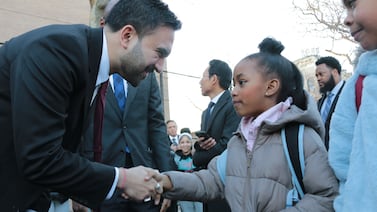Sign up for Chalkbeat Indiana’s free daily newsletter to keep up with Indianapolis Public Schools, Marion County’s township districts, and statewide education news.
After months of criticism from educators, parents, school leaders, and higher education institutions, the Indiana Department of Education has released its second attempt at redesigning the state’s high school graduation requirements.
The draft of the plan, which the department presented to the State Board of Education Wednesday, scraps the two diplomas first proposed by the department in March — the GPS and GPS Plus diplomas.
The new draft proposes a base diploma — currently referred to as the Future New Indiana Diploma — and three pathways leading to enrollment, employment, or enlistment seals that students could earn on top of the base. Each of these three seals also includes a second “plus” tier that would require more advanced courses, work experience, and aptitude.
In a concession to one of the major criticisms of the GPS diplomas, the new draft allows students to earn an Honors Enrollment Seal that meets minimum admission requirements at state universities, without a controversial provision that they also complete at least 75 hours of work experience.
The original purpose of the diploma redesign was to encourage more students to undertake work-based learning in high schools, as Indiana’s college-going rates drop and Republican leaders call on the state to “reinvent high school” by making it more directly relevant to the workforce.
But the work requirements were unpopular with college-bound students and their parents and teachers, who said students would feel pressured to work in order to earn the higher-tier GPS Plus diploma, possibly at the expense of taking college courses. Schools, too, worried about the feasibility of offering work-based learning for the thousands of students who might want it.
Despite the concession, the state hasn’t backed away from the work requirements completely, even for college-bound students. For example, in order to earn the higher tier Honors Enrollment Seal Plus, students would have to complete at least 100 hours of work-based learning, as well as advanced courses. That’s similar to the proposed GPS Plus diploma.
The department will open a second public comment period on the new draft, but officials did not specify when. The first round of public comment received over 8,000 responses.
The department must adopt new diplomas by the end of this year to begin with the Class of 2029. Education officials say they’re still on track to make their deadline.
Proposed base diploma similar to current graduation requirements
The new proposed base diploma has more prescriptive requirements than the GPS diploma, which would have allowed students broad leeway to choose how to earn 20 credits in their 11th and 12th grade years. Additionally, the new proposal does not require students to earn some credits through extracurricular activities, though some of those requirements have been folded into the seal pathways.
The revamped blueprint for the base diploma resembles the current Core 40 diploma to a certain extent, with some changes to the courses required and numbers of credits students must earn in core subjects. For example, while both diplomas require eight credits of English, the new base diploma would prescribe a communications-based course.
In math, the draft base diploma would require only that students take Algebra 1, along with a personal finance class, but then allows students to choose what classes to take to meet four more math credits.
And in social studies, the proposed new diploma would eliminate requirements to take one credit of economics and two credits of world history and replace these with a two-credit requirement of world perspectives. This requirement could be met with advanced world language, or a “world-focused social studies course.”
One of the biggest changes in the base diploma is in electives. While the Core 40 diploma required that students take elective credits in world languages, fine arts, or career and technical education, along with six personalized electives, the revised base diploma would require 12 credits of student choice electives.
Guidance from the department encourages students to use these 12 credits to meet one of the possible seal pathways.
Students could earn up to 3 honors seals
Education officials said the three honors seal pathways focused on employment, enrollment, and enlistment would be optional, and that students could earn just the base diploma.
But those who do would then have to complete the other requirements of the Indiana graduation pathways, which include project- or work-based learning, and some postsecondary preparation.
On the other hand, students who earn a seal would automatically meet the graduation pathways requirements.
Officials believe this would help steer more students to one of the three seals. And there may be a further financial incentive from the state legislature, as schools receive funding for students who complete postsecondary credentials.
Students could earn one, two, or three honors seals. They can also earn an Honors Plus seal in one category, and a regular Honors in another.
“We absolutely want to make sure our children are prepared for excellence in college, and if they dream of going into a career, and if they plan to enlist in our military,” said Secretary of Education Katie Jenner on Wednesday.
The Honors Enrollment Seal resembles the current Core 40 with Academic Honors diploma, with a few key differences: It would require four rather than six credits of world languages, for example, and does not require fine arts.
Additionally, unlike current requirements, students taking AP classes to earn the seal would also have to pass the corresponding AP exams.
The Honors Employment Seal, meanwhile, would require students to undertake 100 hours of work-based learning, while completing a “market-driven credential of value” aligned to an occupation, or three courses in a career and technical education pathway. These credentials of value are still under development with industry partners, according to the state education department presentation.
To earn the higher tier employment seal, students would have to complete 650 hours of work-based learning total, as well as some postsecondary education, like an associate degree, a technical certificate, or the Indiana College Core classes.
For the Honors Enlistment Seal, students would have to earn a score of 31 on the Armed Services Vocational Aptitude Battery (ASVAB) and complete the career exploration tool, as well as receive mentorship from veterans or current military personnel. (A score of 31 is the minimum score to enlist in the Army and to use the test to meet Indiana’s current graduation pathways.)
For the higher tier enlistment diploma, students would need a score of 50 or higher, 100 hours of public service, two seasons of a sport, or a leadership role in an extracurricular activity.
Indiana colleges indicate support for new diploma plan
The education department on Tuesday provided to reporters letters of support for the retooled proposal from colleges, universities, and education groups throughout Indiana.
Purdue University President Mung Chiang, who earlier this month said the GPS diplomas would not meet minimum admission requirements, indicated that the updated proposal with the honors seal would meet “the part of Purdue admissions requirement involving high school curricula.”
“For college-readiness by any interested students and families, it is excellent to see the introduction of the Honors Seal and Honors Plus Seal,” Chiang wrote in his letter.
Letters from officials Indiana University, Ivy Tech, Ball State, and Indiana State University also praised the new diploma draft as clearer and more straightforward. But some also said there were details to be determined.
Among K-12 education groups, the Indiana Association of Public School Superintendents, the Association of School Principals, and the Indiana School Counselor Association indicated their support for the new plan.
But the principals group also noted the need for flexibility regarding any attendance requirement in the employment and enlistment seals. It also encouraged the department to consider adding work-based learning to the enrollment seal.
Indiana State Teachers Association President Keith Gambill said in a statement that the union “had not been asked by the IDOE to review or reply to the draft of the diplomas.”
“We have provided testimony at SBOE meetings and open hearings and have offered to meet,” the statement said.
At the Wednesday meeting, Bartell Berg, a parent and the vice president for the Indiana chapter of the American Association for Teachers of German, expressed concern about the lack of a world language requirement in the base diploma and the seals that lead to paths other than enrollment.
He added that the three seals could pigeonhole students into a single path, despite officials’ best intentions to allow them to change their minds.
“I’m greatly concerned that this tracking will lead to a situation of haves and have-nots, where our schools with less resources simply do not prepare our students for enrollment in higher education,” Berg said.
Aleksandra Appleton covers Indiana education policy and writes about K-12 schools across the state. Contact her at aappleton@chalkbeat.org






